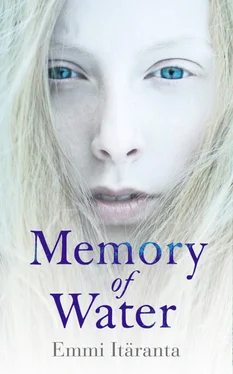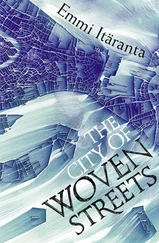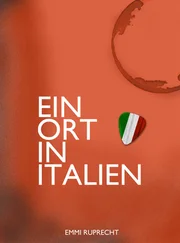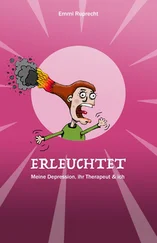I pulled my hand out, wiped it on my trousers and started walking towards the edge of the grave from the wrecked vehicle. After twenty steps I came to a shallow hole I had left a few days earlier. No one else seemed to have been there in the meantime.
I took thick gloves from my bag, pulled them on and began to move things.
I hadn’t talked about this to anyone, but the silver-coloured disc had brought me here. After my father’s death the quiet house seemed to wrap me in heavy sleep, as if the earth was pulling my blood towards its promise of unbroken rest. The silence wasn’t just the silence of the empty spaces my parents had left behind, the lack of their breathing and words and footsteps inside those walls. It was also the silence of everything they had left untold and unsaid, everything that it was now up to me to learn and find out without them. I was only beginning to understand how little I knew: of the spring and other tea masters, of the strange laws and threatened balances of secret alliances and bribery we had lived by, of this whole dark grown-up world stretching like a lightless desert in all directions around me and blurring into the horizon. I was angry with them for leaving me alone without the knowledge I needed. Why didn’t you tell me? But they were not here, there was only earth and wind, and they had no words.
I didn’t quite understand yet why the story of the silver-coloured disc was so important to me, because I didn’t know how to pull together the threads that made it so. One of them was my fear that one day I would find the surface of the spring too low, or blue-clad soldiers in the cave with their sabres pulled, and another was a budding notion, or perhaps a near-vain hope, that there had to be more than this to life, that outside the village, somewhere under the sky, there must be a reason to believe that the world wasn’t dry and scorched and dying beyond all repair. Yet the threads had begun to intertwine in my mind, and not knowing yet how to put the thought to words, I felt an urge to do what I could to restore the story of the disc and find the missing pieces. I looked for them in the books in my mother’s study, and I looked for them among the rubble of the past abandoned in the grave. I was aware of the hopelessness of the task, but it served to take my mind off the irreversible silence of the empty house, and there was something calming about it: a promise of change, a buried chance that might still see the light of day.
The wide and shallow hole I had dug within the weeks after my father’s death had a lot of broken past-technology. It had taken days to find the right place, but I was now fairly convinced that this was where I had first found the silver-coloured disc a few years ago. I had recognised some of the machines lying in the area, remembering that Sanja had rejected several of them because they were too broken to ever be made whole again. All the essential parts were missing, too, so they were no longer useful for her experiments. As far as I recalled, the disc had been close to the surface, but the plastic grave had changed several times since, and if there were any other discs, they could lie a lot deeper – or far from where the first one had been. Still, I didn’t know where else to start looking.
The shadow of the concrete elements turned and grew taller. The first stiff horseflies of the spring pushed their new and heavy bodies into the air around me, then landed on mushy garbage piles again to rest. I would need my hood soon. My limbs ached and my clothes were sticky against my skin. I kept finding nothing but the usual junk: pieces of kitchenware and tattered shoes with broken heels, unrecognisable fragments, endless plastic bags. I moved to the side a crushed past-machine with some wires sticking out from under the cracked shell – it was one of the things that Sanja had deemed useless, and therefore I had no idea what its original purpose had been – and stared at the plastic-bag tangle before me. I decided to go home after dragging it out of the grip of the grave, even though I didn’t believe I would find anything interesting under it. The bags were tied into a long chain that was painfully tightly stuck. Their brittle plastic ripped in my hands as I tried to get a proper hold of the rustling clot. Eventually I felt something give way, and the knot slid smoothly out of the grave. I gathered it into a large ball and threw it to the side.
In the hole I had just made I could see nothing except more plastic bags.
I closed my eyes. My neck muscles felt strained and a headache was creeping up the back of my skull. It seemed to pull my scalp into unpleasant knots, like a too-tight ponytail or plait.
It was time to go home after yet another fruitless search.
I opened my eyes. The broken past-machine I had moved out of the way earlier lay next to me. It wasn’t big. Its hard plastic shell was broken in several places, as if it had been smashed on purpose, and on one side there was a round glass lens that resembled the bottom of a small blaze lantern. The glass was badly cracked. Part of it had fallen out.
I must have seen the same wreck of a machine dozens of times on my treasure-hunts. I must have held it in my hand and moved it dozens of times. If I had looked at it closely years ago, when Sanja chose to leave it behind and I brought the disc back home with me, I wouldn’t have noticed anything worth remembering.
Now sunlight caught on a matte metal plate, no bigger than half of my little finger, engraved and embedded on one side of the machine.
I stared at the engraving, and the world seemed to stop around me.
I read the text again and again.
M. Jansson.
The machine nearly fell apart in my hands when I wrapped it in a rag, pushed it into my bag and climbed up from the hole. Plastic crackled, stirred and murmured under my feet as I walked across the grave as fast as I could manage.
Even if the past-world story recorded on the silver-coloured disc existed in the plastic grave, my chances of finding it had seemed non-existent. Now, for the first time, I dared to think that there might be a real possibility, no matter how minuscule, that I would be able to find a continuation to the story of the disc. The thought grew in my mind like a green and tender branch bursting towards sunlight.
When I got home, I walked straight into my mother’s study and took the machine from my bag. I unwrapped the rag around it and placed it on the only corner of the desk which wasn’t covered in books and handwritten notes. I rolled the blind down, because the sun had turned its light to this side of the house while I was away. A grey-blue shadow fell into the room.
I sat down on the chair and stared at the piles of books. I stared at the paper on which I had written in as much detail as I could everything I remembered of the recording on the silver-coloured disc. I stared at the past-world machine. It was as mute as a dead insect. The strands of late afternoon burned sharp and defined between the slats of the blind.
The Jansson expedition. The Twilight Century. The Lost Lands. M. Jansson.
I knew I didn’t have all the pieces, and that I might never have them. I also knew there was a place where I hadn’t looked yet.
The house was silent and still, the teahouse empty and quiet, and no one walked outside. If my father’s spirit wandered in the rooms or among the trees, it was peaceful, and guarded the landscape it had lived in. The light of the message-pod did not blink. Ants drew their thread-thin paths on the stone slabs of the garden and in the corners of the house, the wood of the walls grew wearier, dust fell on the shelves unnoticed, and there was no one to tell me what to do or ask me what I was doing.
It was dusky in the living room. The lid of the chest lifted easily when I propped it open against the wall, and a faint scent of old paper and ageing ink drifted into the air.
Читать дальше
Конец ознакомительного отрывка
Купить книгу












